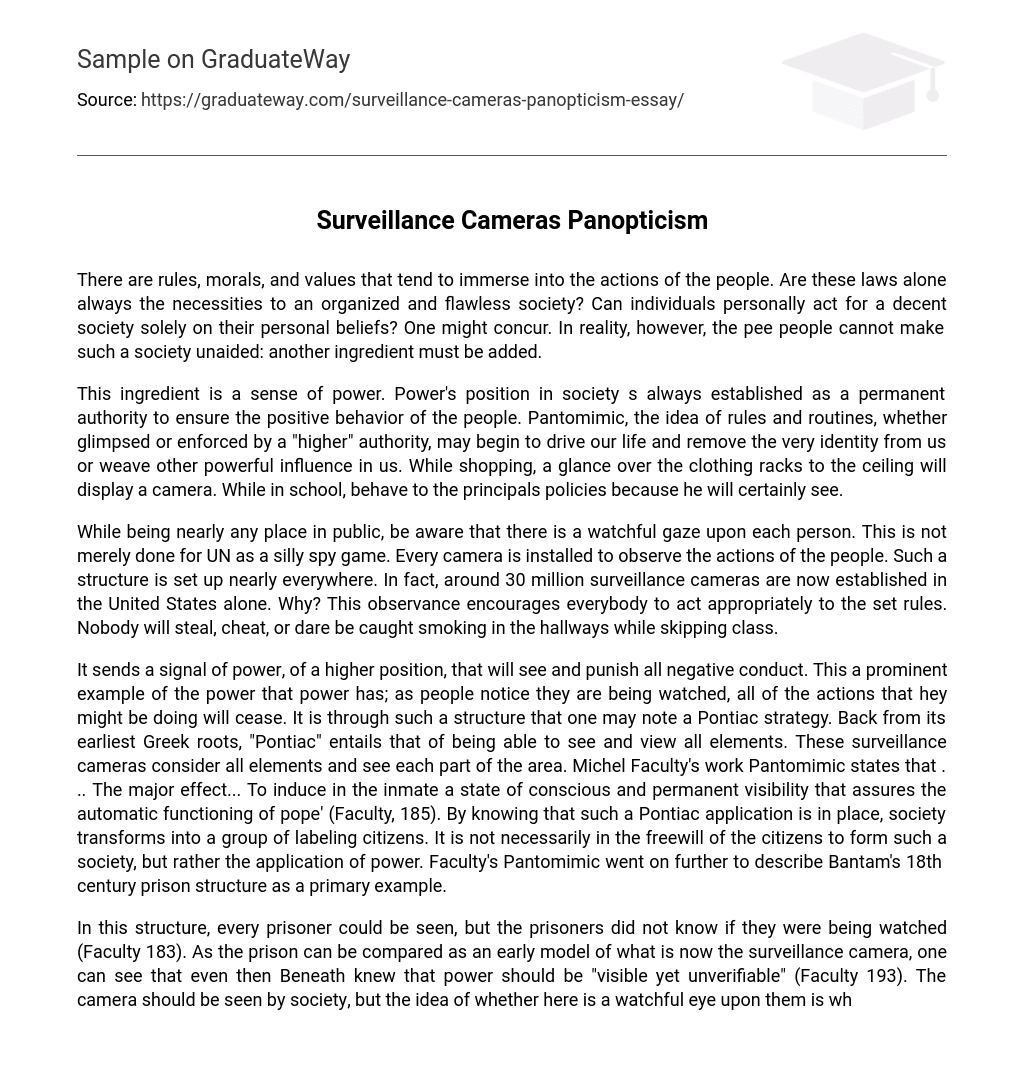There are rules, morals, and values that tend to immerse into the actions of the people. Are these laws alone always the necessities to an organized and flawless society? Can individuals personally act for a decent society solely on their personal beliefs? One might concur. In reality, however, the pee people cannot make such a society unaided: another ingredient must be added.
This ingredient is a sense of power. Power’s position in society s always established as a permanent authority to ensure the positive behavior of the people. Pantomimic, the idea of rules and routines, whether glimpsed or enforced by a “higher” authority, may begin to drive our life and remove the very identity from us or weave other powerful influence in us. While shopping, a glance over the clothing racks to the ceiling will display a camera. While in school, behave to the principals policies because he will certainly see.
While being nearly any place in public, be aware that there is a watchful gaze upon each person. This is not merely done for UN as a silly spy game. Every camera is installed to observe the actions of the people. Such a structure is set up nearly everywhere. In fact, around 30 million surveillance cameras are now established in the United States alone. Why? This observance encourages everybody to act appropriately to the set rules. Nobody will steal, cheat, or dare be caught smoking in the hallways while skipping class.
It sends a signal of power, of a higher position, that will see and punish all negative conduct. This a prominent example of the power that power has; as people notice they are being watched, all of the actions that hey might be doing will cease. It is through such a structure that one may note a Pontiac strategy. Back from its earliest Greek roots, “Pontiac” entails that of being able to see and view all elements. These surveillance cameras consider all elements and see each part of the area. Michel Faculty’s work Pantomimic states that . .. The major effect… To induce in the inmate a state of conscious and permanent visibility that assures the automatic functioning of pope’ (Faculty, 185). By knowing that such a Pontiac application is in place, society transforms into a group of labeling citizens. It is not necessarily in the freewill of the citizens to form such a society, but rather the application of power. Faculty’s Pantomimic went on further to describe Bantam’s 18th century prison structure as a primary example.
In this structure, every prisoner could be seen, but the prisoners did not know if they were being watched (Faculty 183). As the prison can be compared as an early model of what is now the surveillance camera, one can see that even then Beneath knew that power should be “visible yet unverifiable” (Faculty 193). The camera should be seen by society, but the idea of whether here is a watchful eye upon them is what should remain unknown. It is in this way that society will always act in an appropriate manner to agree with the laws.
Otherwise, if one knows when one is not being watched, rules may be broken because nobody is there to witness. Also, Faculty expanded upon Bantam’s idea of the prison structure by applying it to everyday circumstances: “shut up in each cell… A madman, a patient, a condemned man, a worker or a schoolboy” (Faculty, 196). No matter the location, there seems to always be a powerful eye that is watching. Examine a school, for example. There are hall monitors, walking the corridors to see that each student is following their orderly instructions.
At a hospital, there are nurses to see each patient IS pleasantly peaceful; even the visiting hours of family and friends are monitored under time. On the job, the boss’ keen eye keeps the people busy, proficient, and helpful. Then there is the government, with possibly the greatest Pontiac enforcement of all. Consider the Patriot Act of 2001, which allowed law enforcement agencies even more accessibility to search telephone and email communications, medical and financial records, library history, ND even records from casinos, pharmacies, hotels, lawyers, etc. Room any individual. It was created after the September 1 lath attacks for the safety of the people against further terrorism. The power this act held over the people was to protect; this power was to eliminate any further actions, and this power was to daunt those who could possibly harm the nation again. Some felt that this was too much power exerted upon them due to the possibility that some unseen power was getting too far into the privacies of the people. Some began to feel their Fourth Amendment right being taken away.
Had the Pontiac power gone too far in this case? Certainly not. It is with this power that the law enforcement agencies promised security amongst the nation. The knowledge that one can be watching helped to prevent many terrorists. A stronger watchful eye is nothing to be uncomfortable about. As the saying goes: “Rather be safe than sorry’. It is in each moment where some sort of Pontiac power is exerted. It is in each moment that a person somewhere is being watched. In these moments are when people choose to make correct choices due to that presence of Pontiac power.
It is also in these moments that those breaking the law will be noticed. Sure, not all will be captured by a watchful force. But, yet it makes the difference. Even in something as simple as retail, it is noted that 15% of week y losses are reduced with such technology as the surveillance camera. While the cons ant, watchful power system may be controversial to some, all must come to the agreement that it does provide a safer environment with more labeling citizens. Indeed, with that “eye in the sky”, knowing that an observant power exists reinforces positive behavior amongst society.





